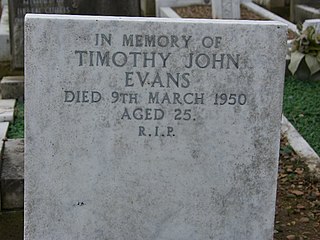Related Research Articles

Forensic science, also known as criminalistics, is the application of science principles and methods to support legal decision-making in matters of criminal and civil law.

Pathology is the study of disease and injury. The word pathology also refers to the study of disease in general, incorporating a wide range of biology research fields and medical practices. However, when used in the context of modern medical treatment, the term is often used in a narrower fashion to refer to processes and tests that fall within the contemporary medical field of "general pathology", an area that includes a number of distinct but inter-related medical specialties that diagnose disease, mostly through analysis of tissue and human cell samples. Idiomatically, "a pathology" may also refer to the predicted or actual progression of particular diseases, and the affix pathy is sometimes used to indicate a state of disease in cases of both physical ailment and psychological conditions. A physician practicing pathology is called a pathologist.

Forensic pathology is pathology that focuses on determining the cause of death by examining a corpse. A post mortem examination is performed by a medical examiner or forensic pathologist, usually during the investigation of criminal law cases and civil law cases in some jurisdictions. Coroners and medical examiners are also frequently asked to confirm the identity of remains.

A coroner is a government or judicial official who is empowered to conduct or order an inquest into the manner or cause of death. The official may also investigate or confirm the identity of an unknown person who has been found dead within the coroner's jurisdiction.

The Serious Fraud Office (SFO) is a non-ministerial government department of the Government of the United Kingdom that investigates and prosecutes serious or complex fraud and corruption in England, Wales and Northern Ireland. The SFO is accountable to the Attorney General for England and Wales, and was established by the Criminal Justice Act 1987, an Act of the Parliament of the United Kingdom.

The Hospital for Sick Children (HSC), corporately branded as SickKids, is a major pediatric teaching hospital located on University Avenue in Toronto, Ontario, Canada. Affiliated with the Faculty of Medicine of the University of Toronto, the hospital was ranked the top pediatric hospital in the world by Newsweek in 2021.
Rick Bartolucci is a former politician in Ontario, Canada. He was a Liberal member of the Legislative Assembly of Ontario from 1995 to 2014. He represented the riding of Sudbury and was a cabinet minister in the government of Dalton McGuinty.
Francis Edward Camps, FRCP, FRCPath was an English pathologist notable for his work on the cases of serial killer John Christie and suspected serial killer John Bodkin Adams.

The medical examiner is an appointed official in some American jurisdictions that investigates deaths that occur under unusual or suspicious circumstances, to perform post-mortem examinations, and in some jurisdictions to initiate inquests. They are necessarily trained in pathology.

A miscarriage of justice occurs when an unfair outcome occurs in a criminal or civil proceeding, such as the conviction and punishment of a person for a crime they did not commit. Miscarriages are also known as wrongful convictions. Innocent people have sometimes ended up in prison for years before their conviction has eventually been overturned. They may be exonerated if new evidence comes to light or it is determined that the police or prosecutor committed some kind of misconduct at the original trial. In some jurisdictions this leads to the payment of compensation.

Innocence Canada, is a Canadian, non-profit legal organization. Based in Toronto, Innocence Canada identifies, advocates for, and helps exonerate individuals who have been convicted of a serious crime which they did not commit and to preventing future wrongful convictions through education and justice system reform.
The Centre of Forensic Sciences (CFS) is a laboratory providing forensic science services to law enforcement agencies in Ontario, Canada. It is part of the government of Ontario Ministry of Solicitor General public safety division.

The Special Investigations Unit is the civilian police oversight agency of the province of Ontario, Canada. The SIU is responsible for investigating circumstances involving police that have resulted in a death or serious injury, or if a firearm was discharged at a person. The unit also investigates allegations of sexual assault. The unit's goal is to ensure that criminal law is applied appropriately to police conduct, as determined through independent investigations, increasing public confidence in the police services.

Medical jurisprudence or legal medicine is the branch of science and medicine involving the study and application of scientific and medical knowledge to legal problems, such as inquests, and in the field of law. As modern medicine is a legal creation, regulated by the state, and medicolegal cases involving death, rape, paternity, etc. require a medical practitioner to produce evidence and appear as an expert witness, these two fields have traditionally been interdependent.
Charles Randal Smith is a former Canadian pathologist known for performing flawed child autopsies that resulted in wrongful convictions.
Bruce A. MacFarlane is a Canadian lawyer, Crown prosecutor, legal scholar, and former federal and provincial Department of Justice official.
The Commission on Proceedings Involving Guy Paul Morin—known as the Kaufman Commission or the Morin Inquiry—was a 1996 royal commission appointed by the Government of Ontario to address the wrongful conviction in 1992 of Guy Paul Morin for the murder of Christine Jessop on 3 October 1984, for which he was exonerated by DNA evidence on 23 January 1995.
This is a list of notable overturned convictions in Canada.
In many legal jurisdictions, the manner of death is a determination, typically made by the coroner, medical examiner, police, or similar officials, and recorded as a vital statistic. Within the United States and the United Kingdom, a distinction is made between the cause of death, which is a specific disease or injury, versus manner of death, which is primarily a legal determination versus the mechanism of death which does not explain why the person died or the underlying cause of death and can include cardiac arrest or exsanguination. Different categories are used in different jurisdictions, but manner of death determinations include everything from very broad categories like "natural" and "homicide" to specific manners like "traffic accident" or "gunshot wound". In some cases an autopsy is performed, either due to general legal requirements, because the medical cause of death is uncertain, upon the request of family members or guardians, or because the circumstances of death were suspicious.
Stephen T. Goudge is a justice of the Court of Appeal for Ontario, Canada.
References
- 1 2 "Dr. Charles Smith: The man behind the public inquiry". CBC News. Retrieved 2016-02-22.
- ↑ "Ontario wants to adopt all of the legislative changes recommended in a scathing judicial report on a forensics scandal that branded innocent people as child killers". The Toronto Star. 2008-10-23. ISSN 0319-0781 . Retrieved 2016-02-22.
- ↑ "Ontario's forensic pathologists better equipped in 'search for truth'". Toronto Star. Retrieved 2016-02-22.